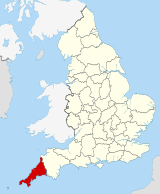Portal:Cornwall
  Cornwall (/ˈkɔːrnwɔːl, -wəl/; Cornish: Kernow; Cornish pronunciation: [ˈkɛrnɔʊ]; or [ˈkɛrnɔ]) is a ceremonial county in South West England. It is recognised by Cornish and Celtic political groups as one of the Celtic nations, and is the homeland of the Cornish people. The county is bordered by the Atlantic Ocean to the north and west, Devon to the east, and the English Channel to the south. The largest urban area in the county is a conurbation that includes the former mining towns of Redruth and Camborne, and the county town is the city of Truro. The county is rural, with an area of 1,375 square miles (3,562 km2) and population of 568,210. Outside of the Redruth-Camborne conurbation the largest settlements are Falmouth, Penzance, Newquay, St Austell, and Truro. For local government purposes most of Cornwall is a unitary authority area, with the Isles of Scilly having a unique local authority. The Cornish nationalist movement disputes the constitutional status of Cornwall and seeks greater autonomy within the United Kingdom. Cornwall is the westernmost part of the South West Peninsula, and the southernmost county within the United Kingdom. Its coastline is characterised by steep cliffs and, to the south, several rias, including those at the mouths of the rivers Fal and Fowey. It includes the southernmost point on Great Britain, Lizard Point, and forms a large part of the Cornwall National Landscape. The national landscape also includes Bodmin Moor, an upland outcrop of the Cornubian batholith granite formation. The county contains many short rivers; the longest is the Tamar, which forms the border with Devon. (Full article...) Selected articleSt Carantoc's Church, Crantock is in the village of Crantock, Cornwall, England. Since 1951 the church has been designated as a Grade I listed building. It is an active Anglican parish church in the diocese of Truro, the archdeaconry of Cornwall and the deanery of Pydar. Its benefice is combined with that of St Cubert. (Full article...) Selected biographyAdmiral of the Blue Edward Boscawen, PC (19 August 1711 – 10 January 1761) was a British admiral in the Royal Navy and Member of Parliament for the borough of Truro, Cornwall, England. He is known principally for his various naval commands during the 18th century and the engagements that he won, including the siege of Louisburg in 1758 and Battle of Lagos in 1759. He is also remembered as the officer who signed the warrant authorising the execution of Admiral John Byng in 1757, for failing to engage the enemy at the Battle of Minorca (1756). In his political role, he served as a Member of Parliament for Truro from 1742 until his death in 1761 although, due to almost constant naval employment, he seems not to have been particularly active. He also served as one of the Lords Commissioners of the Admiralty on the Board of Admiralty from 1751 and as a member of the Privy Council from 1758 until his death. (Full article...)
Did you know?
Selected quoteSelected picture
General imagesThe following are images from various Cornwall-related articles on Wikipedia.
WikiProjects
Related portalsTopicsHistory
Geography
Politics
Economy and demographics
Culture
SubcategoriesRecognised content
Featured articlesMain page featured articlesFeatured listsGood articles
Former good articlesIn the News articlesThings you can do'
Associated WikimediaThe following Wikimedia Foundation sister projects provide more on this subject:
Wikipedia in CornishDiscover Wikipedia using portals
| |||||||||||||||||||||||||||||||





































































